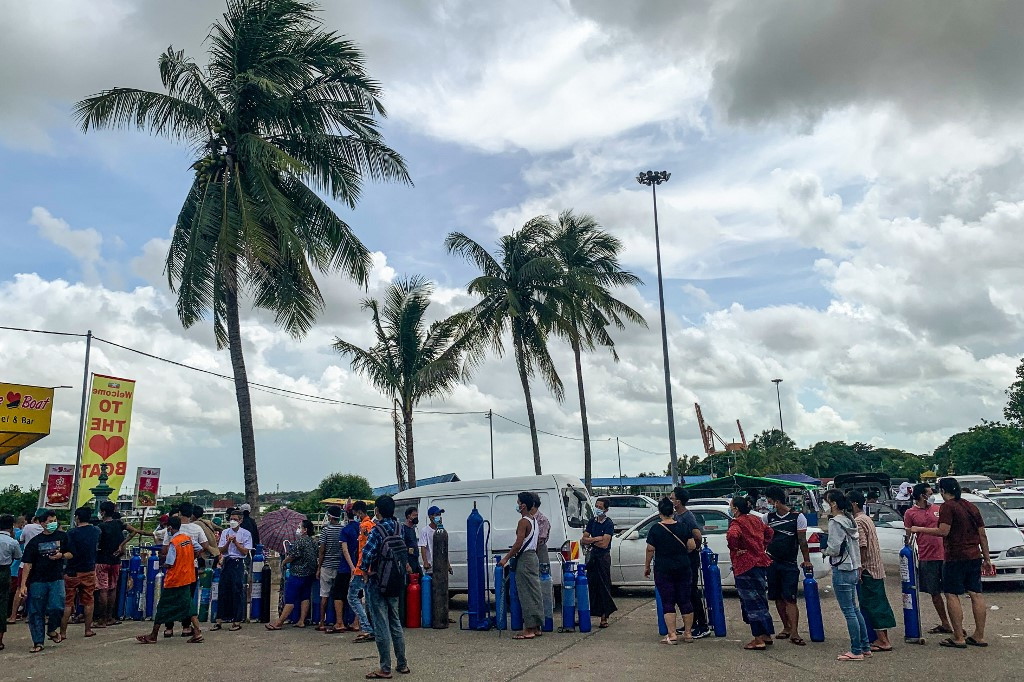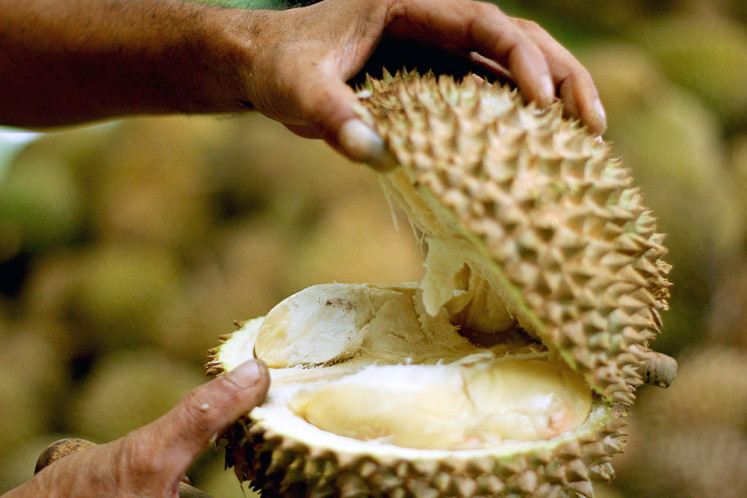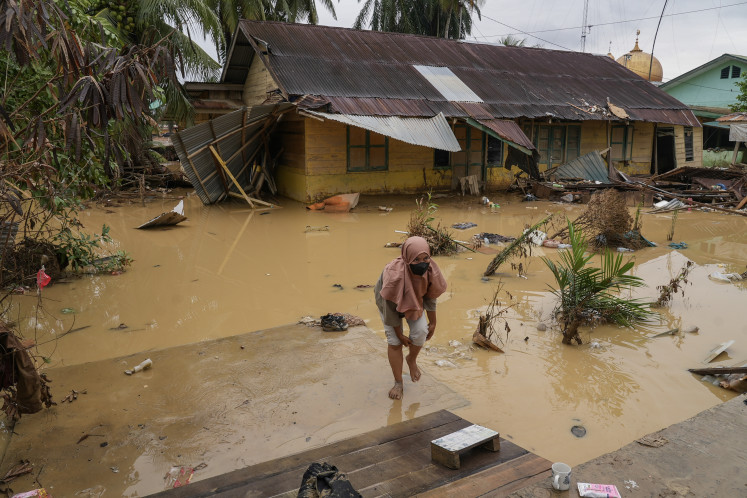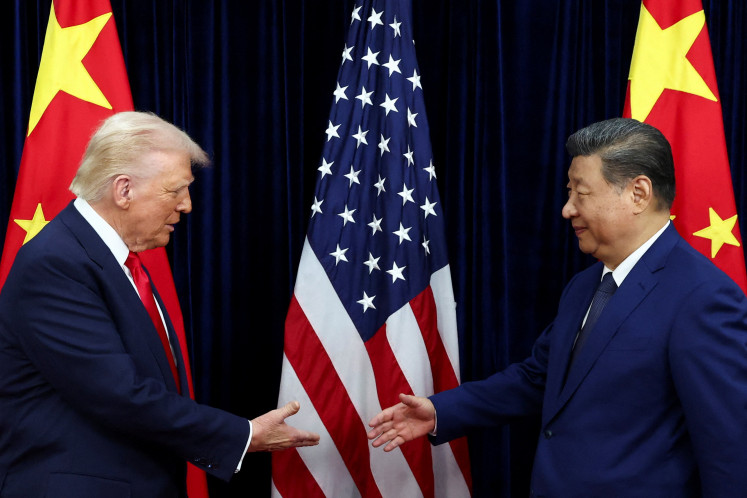Popular Reads
Top Results
Can't find what you're looking for?
View all search resultsPopular Reads
Top Results
Can't find what you're looking for?
View all search resultsMyanmar: Negotiating a public health emergency truce
Unfortunately, despite all the pressure from Jakarta, it is now apparent that what is going in Myanmar cannot be solved neither locally nor regionally.
Change text size
Gift Premium Articles
to Anyone
 People wait to fill empty oxygen canisters at a location donating oxygen at no cost in Yangon, on July 14, 2021. Residents across Myanmar's biggest city are defying a military curfew in a desperate search for oxygen to keep their loved ones breathing as a new coronavirus wave crashes over the coup-wracked country. (AFP/Ye Aung Thu)
People wait to fill empty oxygen canisters at a location donating oxygen at no cost in Yangon, on July 14, 2021. Residents across Myanmar's biggest city are defying a military curfew in a desperate search for oxygen to keep their loved ones breathing as a new coronavirus wave crashes over the coup-wracked country. (AFP/Ye Aung Thu)
T
here have been, all compressed in the span of a week, the 54th ASEAN Foreign Ministers’ Meeting, the East Asia Summit (EAS), ASEAN Regional Forum (ARF), the Friends of the Mekong and the United States-ASEAN Foreign Ministerial meetings and, overshadowing all these events, we are bearing witness to the inevitable clashes for influence between China and the US.
It is not a Copernican revelation but from all these engagements it is self-evident that the Southeast Asia region does matter a lot and it is unfortunate that the regional framework disappointingly just relies on the concept of cooperation rather than one based on integration.
Cooperation is founded on the mantra of absolute unanimity, something that is killing not only the regional prospects of a stronger community of nations in Southeast Asia but is also, albeit indirectly, allowing massive killings in Myanmar to go unpunished.
A decision-making process, based on total consensus, might work for an economic association whose ambitions are limited to creating a regional free market but nothing else, not even the dream of a regional currency union would be admissible because it requires ceding too much national sovereignty.
Instead, at least on paper, the ambitions of the ASEAN group go well beyond a common market.
Founded on Aug. 8, 1967, the association is based on three pillars, three so-called "communities", that cover the entire spectrum of policymaking from security to cultural cooperation.
All based on unanimity and consensus.
As consequence the fact that ASEAN also wanted to be the main “deal maker” in the crisis unfolding in Myanmar was initially seen positively from many quarters.
After all, why should the western nations or China keep trying solving issues when there is a group of neighboring nations who have a much better understanding of local dynamics and local culture?
Unfortunately, despite all the pressure from Jakarta, it is now apparent that what is going in Myanmar cannot be solved neither locally nor regionally.
Writing about gloomy scenarios at the moment might seem preposterous especially when, after so many months of negotiations, we finally have an ASEAN envoy appointed to mediate the crisis that is not just political but is also a COVID-19--induced humanitarian tragedy that could become much worse in the days ahead.
While we all wish all the best to Erywan Yusof, the senior diplomat from Brunei appointed as special envoy, we are aware that there are much higher chances of him failing than succeeding in this mediation.
After all, the junta does not want to concede any ground and by reading the speech of its leader, Gen. Min Aung Hlaing, now the self-proclaimed prime minister of the country, it seems that we are living on different planets.
To him, the brutal crackdown on protesters was just the consequential response to the anarchy and chaos created by all those civilians rejecting the coup. This is the crazy and faked reality that Indonesian Foreign Minister Retno LP Marsudi has to deal with while negotiating with her peers in ASEAN.
As things stand for now it is hardly imaginable that a political compromise, facilitated by Yusof, would emerge between the people of Myanmar, represented by the National Unity Government and the junta.
Yet what counts the most at the moment is perhaps not finding a solution to the political crisis but instead laying the foundations to avoid a humanitarian catastrophe.
That is why, to start with, Yusof might scale down his ambitions and just focus on creating the conditions through which humanitarian corridors can be created so that the unfolding public health crisis can be resolved with the least possible deaths.
It is not about dodging the hot issue of a political solution to the crisis but instead is about focusing on avoiding a preventable disaster.
While many now fighting in the resistance are ready to sacrifice their lives for democracy and human rights, the third COVID-19 outbreak could have unimaginable consequences for thousands and thousands of citizens that do not deserve to die.
It is not going to be easy to nudge the junta to a dialogue focused on public health, but here is where Retno must step in to ensure that Yusof will be supported by the international community in creating what could become a public health truce in Myanmar.
Such a truce will also give time to the international community to pressurize the junta to deescalate its crackdown on human rights, giving a pause to the ongoing massacre.
Ultimately this crisis will not be solved alone by ASEAN’s mediation.
We were hopeful months ago but the working approach of this group of nations, unable even to establish a communication channel with the Government of National Unity because the junta is still considered the legitimate representative of the people of Myanmar, will not enable a solution of the political crisis.
While we are not surprised that Tokyo and Delhi cynically are putting their trust in ASEAN’s consensus, only China and the US can bring about a possible solution to the political crisis.
Interestingly, Deputy Secretary of State Wendy R. Sherman spoke with Zir Mar Aung, the acting foreign minister in the National Unity Government on Aug. 4.
For a country such as Indonesia that has invested so much in trying to solve this stalemate and is the most vocal in criticizing the junta, remaining committed to ASEAN’s process should not preclude other bolder and visible unilateral negotiations.
A focus on avoiding thousands of deaths due to COVID-19 through a public health emergency truce is the only effort worthy negotiating right now and it does not mean giving a free pass to Gen. Aung Hlaing.
That is why Jakarta should not just play at ASEAN’s negotiating table. The pressure on the generals cannot but increase.
***
The author is based in Kathmandu. He writes on social inclusion, youth development, regional integration and the SDGs in the context of Asia Pacific.









